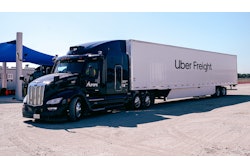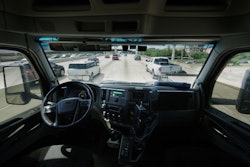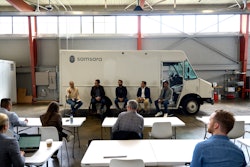Trucking news and briefs for Monday, June 9, 2025:
Senate proposes changes to AI-tech regulation provision in 'One Big Beautiful Bill'
Included in the text of the House of Representatives' "One Big Beautiful Bill Act" budget legislation is a provision that would place a ban, essentially, on states "limiting, restricting, or otherwise regulating artificial intelligence models, artificial intelligence systems, or automated decision systems" in interstate commerce, according to the text of the legislation.
If such were to become law, the definition would seem to put the brakes on legislative efforts to backstop safety and employment opportunities in the face of increasingly capable automated trucks and driving systems like Aurora's "Driver" and others.
Some Republicans in the U.S. House, despite voting for the measure, have begun speaking up against it, and it saw significant proposed modification in the Senate Commerce Committee's efforts to draw up a version of the legislation to reconcile with the passed House version. That House version would have prohibited enforcement of such AI-restrictive laws or regulations by states for a period of 10 years.
Per reporting in Politico, Senate Republicans have proposed to make "the legal freeze" on state laws "a prerequisite for receiving internet expansion grant money" from the federal "Broadband Equity, Access, and Deployment, or BEAD, program."
In essence, for states, enforcement of any AI-related regulation would mean no access to those federal monies for expanding broadband instead of a blanket prohibition of limiting or restricting AI through regulation.
Such a provision, if it becomes law, would put up roadblocks in the way of efforts like the Texas House of Representatives' recent consideration of a prohibition on removing human drivers from the cab of an automated commercial vehicle in operation.
That legislation, following two unsuccessful similar attempts in California in prior years (both vetoed by the governor), advanced from committee in Texas by an 11-2 committee vote shortly following the Aurora Innovations company's public communications that it had launched commercial "driverless" operations along the Houston-Dallas lane there.
Subsequent announcements by the company revealed Aurora's truck manufacturer partner concerns about the move, as the company put an operator back in the driver's seat. The same Aurora communication noted an "observer" had "been riding in the back of some of our trips," presumably in the sleeper.
It's worth noting legislation introduced in the Texas State Senate late in May would do essentially the opposite of the House prohibition on driverless vehicles. Among provisions of SB 2425 is one that stipulates "neither a licensed human driver nor a license ... is required to operate an automated motor vehicle if the automated driving system installed on the vehicle is engaged."
Senator calls for investigation into Chinese autonomous trucking company
A U.S. Senator has called on the Department of Justice to launch an investigation into TuSimple, a Chinese autonomous trucking company that operated in the United States from its founding in 2015 until it ceased U.S. operations in late 2023.
Sen. John Hawley (R-Missouri) on May 30 penned a letter to Attorney General Pam Bondi, urging the investigation into TuSimple “for potential violations of U.S. export controls, unauthorized transfers of sensitive technology to the People’s Republic of China, and any associated breaches of national security.”
In the letter, Hawley pointed to an investigation by the Wall Street Journal that found “TuSimple systematically shared proprietary data, source code, and autonomous driving technologies with Chinese state-linked entities, in blatant disregard of a 2022 national security agreement with the Committee on Foreign Investment in the United States (CFIUS),” Hawley said.
The Journal reported that TuSimple (now CreateAI) sent “a trove of data” of an American autonomous vehicle system to a Beijing-owned company after it agreed with CFIUS not to share data with Chinese entities. WSJ alleged that TuSimple paid a $6 million settlement without admitting fault.
“These reports also revealed communications from TuSimple personnel inside China requesting the shipment of sensitive Nvidia AI chips and detailed records showing ‘deep and longstanding ties’ with Chinese military-affiliated manufacturers,” he added. “To date, TuSimple has not faced serious consequences for sharing American intellectual property with China.”
Hawley said that if the reports are true, “they represent not just a violation of export law, but a breach of national trust and a direct threat to American technological leadership.”
“The American people deserve to know how and why a supposedly U.S.-based company was allowed to serve as a conduit for the transfer of sensitive innovations to the Chinese Communist Party,” he added.
Specifically, Hawley asked Bondi and the DOJ to answer these questions during the requested investigation:
- Did TuSimple provide protected information to Hydron, Foton, BAIC Group, or any other affiliated Chinese entity?
- What steps has the Department of Justice taken to ensure that Bot Auto – a new, Texas-based self-driving truck company staffed with former TuSimple employees and backed by Chinese capital – does not engage in similar behavior?
- What activities were covered by TuSimple’s national security agreement with CFIUS?
- What were the infractions of this agreement for which TuSimple paid a $6 million settlement?
- Are CFIUS-brokered national security agreements adequate mechanisms for controlling high-risk companies with known ties to the Chinese Communist Party?
Truck Parking Club surpasses 2,000 locations
Truck Parking Club announced this week that it has surpassed 2,000 Property Member locations across all lower 48 states, providing more than 40,000 instantly reservable truck parking spaces for truck drivers.
The milestone represents a doubling of locations in just six months, the company said, driven by demand from truck drivers seeking reliable parking and property owners looking to monetize unused space.
"This isn't just about hitting a number -- it's about solving a decades-old problem that costs the trucking industry billions annually," said Evan Shelley, co-founder and CEO of Truck Parking Club. "Every new location means drivers spend less time searching and more time earning. Our goal is clear: reduce parking search time to under 10 minutes per day."
The company's network includes diverse property types from trucking companies and repair shops to storage facilities and real estate investors, creating a scalable solution to a problem traditionally addressed through expensive and slow infrastructure projects. New truck parking construction typically costs $100,000-$200,000 per space and takes years to complete, while Truck Parking Club can activate existing spaces within a day, the company noted.
The platform offers hourly, daily, weekly, and monthly reservations through its website and mobile apps, backed by 24/7 customer service staffed by former truck drivers.










